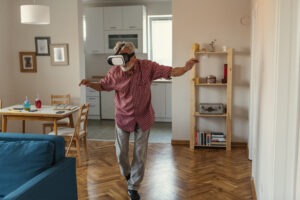Virtual reality study aims to assess link between navigation and Alzheimer’s disease
Healthy volunteers aged 40 and over are being invited to take part in a new study using virtual reality to assess how well people navigate their surroundings. The idea is that this will help researchers spot early signs of Alzheimer’s disease.
What does the study involve?
In the first session participants will play a game using virtual reality goggles called the ‘Cave Crystal Quest’. The game involves several levels where participants explore a cave in order to find a hidden crystal. They are then asked to complete a questionnaire about their experiences and how easy they found it to navigate the game.
In the second session, participants will complete written questionnaires about their cognitive abilities. This is so these can be compared with the data on their abilities to navigate collected in the first session.
It is hoped that the data collected on navigation could then be used as healthy control data for comparison with the performance of people with the early signs of Alzheimer’s disease. These signs could include difficulty following a route or getting lost.
The Virtual Reality Navigation study, which is recruiting participants through Join Dementia Research, is funded by the Wellcome Trust and led by University College London (UCL).
Why is navigation being assessed?
Previous evidence shows that early signs of Alzheimer’s disease can show up in a person’s ability to navigate.
A common symptom of Alzheimer’s disease is feeling ‘lost’ even in familiar places. This is especially true of people aged 65 and over in the early stages of the disease.
In this study, researchers are using a virtual reality game to attempt to measure how well people can keep track of where they are and how well they remember where they have been.
Data from the study will be used to determine a person’s ability to navigate. It is then hoped that similar virtual tests could be developed to spot the early stages of Alzheimer’s disease by revealing problems with navigation.
Who can take part?
The study is recruiting 25 participants each from two age groups, so that they can be compared:
- 40 to 59
- 65 and over
In order to take part, participants must not have any pre-existing cognitive impairments or be taking medication for a mental health condition. Their performance will be useful for comparison with those with mild cognitive impairment or early stage Alzheimer’s disease.
The study will involve two 90-minute sessions at the UCL Institute of Cognitive Neuroscience in London. These can be completed in 1 or 2 study visits, depending on the availability of participants.
The study’s chief investigator, Professor Neil Burgess, Professor of Cognitive and Computational Neuroscience at UCL, said: “Problems with navigation such as getting lost or struggling to follow directions may be nothing to worry about, but they can be an early sign of Alzheimer’s dementia. Finding a way to assess these problems at an early stage could help us diagnose and track the progress of the condition in a less invasive way than with current tests.
“We are excited at the potential that this game – and virtual reality more broadly – might have for assessing the cognitive impact of Alzheimer’s disease.”
To find out if you are eligible to take part in a dementia study, sign in to your Join Dementia Research account or, if you are not already registered, sign up today.

